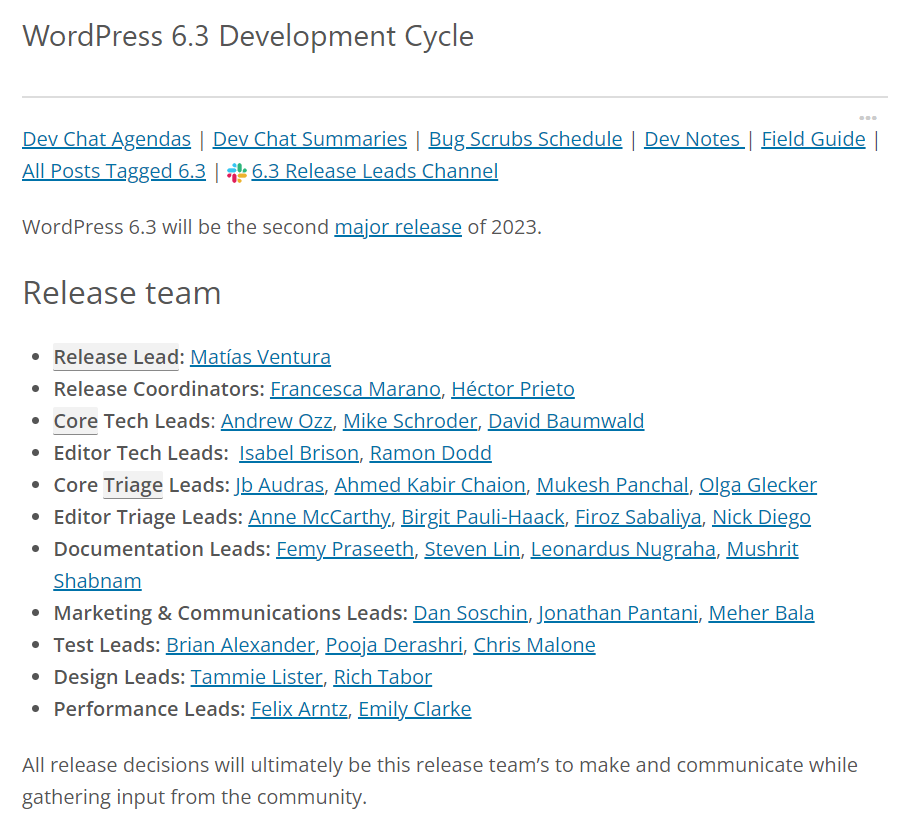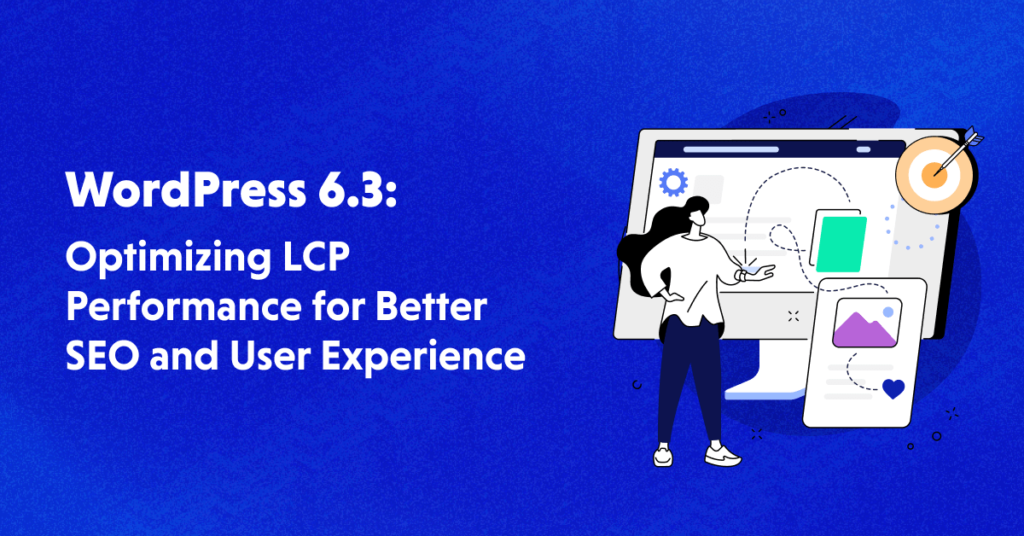
Disclaimer: This is a guest blog submitted by Dominic Tanui – hirewordpressdeveloper.org
WordPress has established itself among the most popular CMS globally, empowering millions of websites. In its continuous effort to enhance user experience and improve SEO performance, WordPress frequently releases newer versions with improvements and bug fixes compared to the previous versions.
Carrying the tradition, WordPress is releasing a major update, i.e., WordPress 6.3, on 8th August 2023. The 6.3 version release will offer significant updates, mainly focused on optimizing the Largest Contentful Paint (LCP) performance.
You might wonder a CMS that powers over 43.1% of all websites online; why would its latest release focus primarily on LCP? The focus is valid since LCP is a key metric for user experience.
LCP refers to the time it takes for the largest content element on a webpage to become visible to users. And this blog will explore more about LCP and other changes introduced in WordPress 6.3 that will positively impact your site’s SEO performance.
WordPress 6.3: An Overview
WordPress 6.3 brings a host of improvements to streamline LCP optimization and deliver faster-loading websites. These changes are based on meticulous analysis and feedback from the WordPress community.
WordPress aims to enhance LCP performance and improve the overall user experience by implementing these updates.

~ Image Source: WordPress.org
WordPress 6.3: New Features & Enhancements
This section covers the feature additions and the improvements expected in WordPress 6.3 (the upcoming major version).
Improved LCP Performance
Considered the most talked-about enhancement in WordPress 6.3 is the addition of the fetchpriority attribute to the LCP image. This attribute informs the browser to prioritize the LCP image even before it has computed the layout, resulting in faster load times.
WordPress will now automatically add the fetchpriority attribute with a “high” value to the image deemed the largest content element in the viewport. This optimization typically leads to LCP improvements ranging from 5 to 10, significantly enhancing the user experience.
To learn more about the fetchpriority in WordPress 6.3, refer to this section.
Enhancements in Lazy-Loading Handling
WordPress 6.3 will bring further adjustments and fixes to improve the automatic handling of lazy loading via the loading attribute. Lazy-loading allows images to be loaded only when they enter the viewport, conserving bandwidth and improving performance.
The improvements in WordPress 6.3 will ensure more reliable detection of when to omit the loading attribute from certain images. This effort builds upon the work initiated in WordPress 5.9 and continued in WordPress 6.2. The comprehensive assessment of the remaining issues resulted in all of them being resolved in WordPress 6.3.
To achieve optimal performance, avoiding lazy-loading in-viewport images, especially the LCP image, is crucial.
Introducing the wp_get_loading_optimization_attributes() Function
WordPress 6.3 will introduce a new function called wp_get_loading_optimization_attributes(), enhancing the support for customizing image loading optimization attributes throughout the WordPress core.
Notably, the function allows for rendering custom header images in themes, automatically incorporating relevant loading optimization attributes. Developers will be able to ensure a more streamlined approach to image loading optimization using the wp_get_loading_optimization_attributes() function consistently across WordPress.
Customization of Image Priority and Lazy-Loading Behavior
The new wp_get_loading_optimization_attributes() function will allow developers to customize image-loading attributes. If attributes like fetchpriority or loading are manually set on an image before utilizing this function, the function will preserve those attributes.
Doing so will enable fine-tuning image loading behavior, allowing developers to tailor it to their specific requirements. However, it’s important to note that setting both fetchpriority=”high” and loading=”lazy” for an element will trigger a warning. So, developers should be careful to avoid conflicting attribute combinations.
Addressing Lazy-Loading Issues
WordPress 6.3 addresses various outstanding issues related to incorrect lazy-loading. In some instances, the loading=”lazy” attribute was being added to images that should not have it. To rectify this, fixes were implemented, ensuring that the loading attribute is applied correctly.
Additionally, the default value for the wp_omit_loading_attr_threshold filter was changed from 1 to 3, resulting in more accurate and effective lazy-loading behavior. It’s important to note that these fixes do not impact the underlying developer APIs, maintaining compatibility with existing code.
Deprecated Functions in WordPress 6.3
With the introduction of wp_get_loading_optimization_attributes() in WordPress 6.3, several existing functions are being deprecated. These functions were related to handling loading optimization attributes and are now replaced by the new function.
The deprecation of these functions streamlines the loading optimization process and encourages the adoption of the wp_get_loading_optimization_attributes() function.
Now that we’ve covered the additions and deprecations in WordPress 6.3, we’ve seen a lot on LCP and the fetch priority. Let’s learn more about these two elements.
Importance of Largest Contentful Paint (LCP)
Largest Contentful Paint (LCP) is a vital metric for measuring user experience. It represents the time the largest content element takes to become visible to users. A fast LCP contributes to a positive user experience, ensuring users can access the webpage’s main content quickly.
Furthermore, search engines consider LCP an important factor in determining SEO rankings. By optimizing LCP performance, website owners can improve their search engine visibility and attract more organic traffic.
Benefits of Improved LCP SEO Performance
The improvements offered by WordPress 6.3 in LCP optimization provide numerous benefits for website owners. By optimizing LCP, websites can achieve faster loading speeds, ensuring that users can quickly access the content they desire.
Improved loading times lead to enhanced user satisfaction, reduced bounce rates, and increased engagement. Furthermore, search engines prioritize websites with better LCP performance, resulting in higher SEO rankings and increased organic traffic. Investing in LCP optimization is essential for website owners looking to maximize their online presence.
Understanding Fetch Priority HTML Attribute
The fetchpriority attribute introduced in WordPress 6.3 plays a crucial role in optimizing LCP performance. By adding the fetchpriority attribute with a “high” value to the LCP image, WordPress instructs the browser to prioritize loading that image.
The high prioritization occurs even before the browser has completed the layout calculations, resulting in faster loading times and improved user experience. The fetchpriority attribute serves as a valuable tool for website owners and developers seeking to enhance LCP performance and boost SEO rankings.
Why Should You Upgrade to WordPress 6.3?
Each WordPress version release offers fixes and enhancements not found in the previous versions. So, the best practice is to upgrade to the latest versions for a seamless online experience.
Specifically, upgrading to WordPress 6.3 will help you significantly boost your site’s performance and SEO. The latest version focuses on optimizing the Largest Contentful Paint (LCP) performance, a crucial metric for user experience and SEO rankings. Here’s why you should consider upgrading to WordPress 6.3:
- Improved LCP Performance: WordPress 6.3 introduces the fetchpriority attribute, which prioritizes loading the largest content element before the browser has computed the layout. The LCP optimization leads to faster load times and a better user experience.
- Enhanced Lazy-loading Handling: With further adjustments and fixes, WordPress 6.3 improves the automatic handling of lazy-loading through the loading attribute. The improved lazy-loading ensures reliable detection of when to omit the loading attribute from certain images, including the LCP image.
- Customization of Image Priority and Lazy-Loading Behavior: The new wp_get_loading_optimization_attributes() function will allow developers to customize image loading attributes, allowing fine-tuning to specific requirements.
- Deprecated Functions: WordPress 6.3 deprecates several existing functions related to loading optimization attributes, encouraging the adoption of the new wp_get_loading_optimization_attributes() function for a streamlined approach.
So, if you don’t want to miss out on the above enhancements, you should upgrade your WordPress version to 6.3. Doing so will help you achieve faster loading speeds, improved user satisfaction, higher SEO rankings, and increased organic traffic.
WordPress 6.2 vs. WordPress 6.3: Comparison Table
Here’s a comparison table highlighting the key differences between WordPress 6.2 and the latest WordPress 6.3 in terms of LCP optimization and SEO performance:
| Feature | WordPress 6.2 | WordPress 6.3 |
| LCP Image Fetchpriority Attribute | Not available | Introduces fetchpriority attribute to prioritize LCP image loading. |
| Lazy-loading Handling Enhancements | Initial lazy-loading improvements | Further fixes to ensure more reliable detection of when to omit loading attribute |
| wp_get_loading_optimization_attributes() Function | Initial lazy-loading improvements | Introduces wp_get_loading_optimization_attributes() function for customized image loading attributes. |
| Customization Flexibility | Limited customization options | Developers can customize image loading attributes using wp_get_loading_optimization_attributes() |
| Deprecated Functions | Not available | Certain loading optimization functions are deprecated in favor of the new function |
| Addressing Lazy-loading Issues | Not available | Fixes implemented for incorrect lazy-loading of images, ensuring proper behavior |
With WordPress 6.3, website owners and developers can access better LCP optimization tools, increased customization options, and fixes for lazy-loading issues, improving SEO performance and user experience.
Upgrading to the latest version is a proactive step towards optimizing your WordPress website and staying ahead in the competitive online landscape.
Cloudways: Optimizing WordPress Performance
Developers and website owners can leverage Cloudways to achieve optimal LCP performance and further enhance their WordPress websites. But why Cloudways? Because not only is it a renowned managed hosting platform with the right feature set for optimal WordPress performance optimization, but it also offers you additional benefits at an affordable cost.
With WordPress hosting as low as $11/month, you get several benefits, including page load time optimization, proactive app monitoring, dedicated workflows, leading security measures, and additional services like Cloudflare Enterprise & SafeUpdates.
Additionally, Cloudways provides 24/7 premium support, ensuring that any concerns or issues related to WordPress performance are promptly addressed.
Final Thoughts
WordPress 6.3 introduces significant improvements to optimize LCP performance and enhance SEO rankings. By adding the fetchpriority attribute and enhancing lazy-loading handling, WordPress 6.3 empowers website owners and developers to deliver faster-loading websites and improved user experiences.
Optimizing LCP is crucial for maintaining a competitive edge in the online landscape, as it directly impacts user satisfaction, SEO performance, and organic traffic. By adopting the enhancements offered by WordPress 6.3 and leveraging platforms like Cloudways, website owners can unlock the full potential of their WordPress websites and achieve online success.
Author’s Bio
 |
My name is Dominic Tanui, the founder and owner of hirewordpressdeveloper.org. With a deep passion for web development and a profound understanding of the power of WordPress, I established this company in March 2023 to provide exceptional WordPress development services globally. At hirewordpressdeveloper.org, our mission is to bring our clients’ unique website stories to life through creative design, seamless functionality, and optimized performance. With a team of highly skilled WordPress developers, we stay up-to-date with industry trends and tools to deliver cutting-edge solutions that drive our clients’ online success. |
Customer Review at 
“Beautifully optimized hosting for WordPress and Magento”
Arda Burak [Agency Owner]
Sarim Javaid
Sarim Javaid is a Digital Content Producer at Cloudways. He has a habit of penning down his random thoughts and giving words and meaning to the clutter of ideas colliding inside his mind. His obsession with Google and his curious mind add to his research-based writing. Other than that, he’s a music and art admirer and an overly-excited person.
